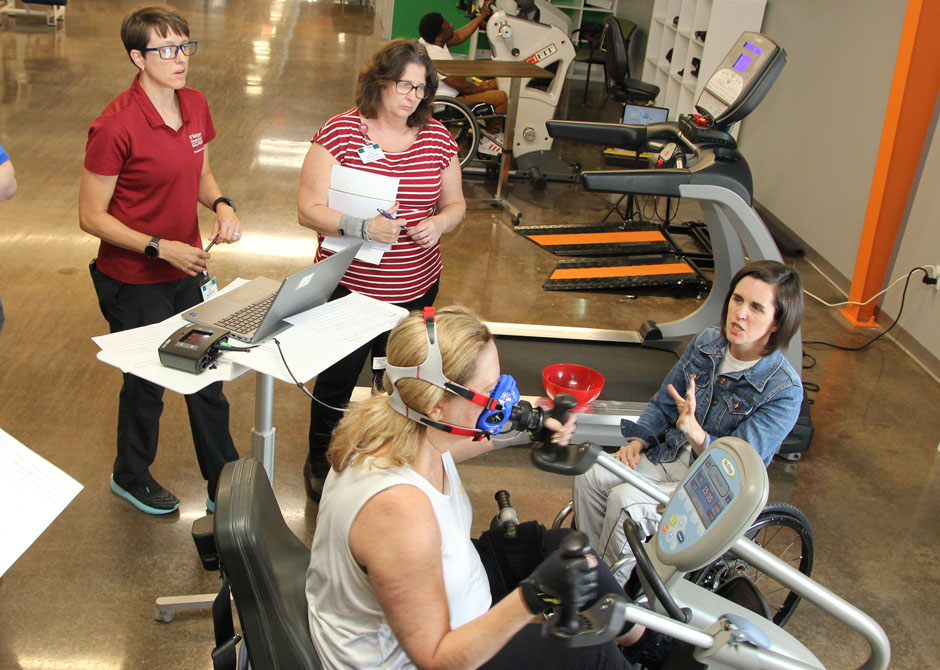Rehabilitation and Participation Science
Program in Occupational Therapy
by Stephanie Stemmler • October 2, 2023

Left to right: Sue Tucker, OTD, OTR/L, ATP, Carla Walker, OTD, OTR/L, ATP, and Kerri Morgan, PhD, OTR/L, ATP, monitor practice participant Donna Carpenter as she trials an exercise session for Morgan's study.
In an accessible, community-based fitness center near the campus of Washington University Medical Center, occupational therapists are engaged in a five-year study to identify evidence-based interventional strategies that increase the level of cardiometabolic fitness in individuals using wheelchairs.
“We have anecdotal evidence that increased physical activity can decrease fatigue and pain, but the real benchmark we want to measure is whether or not cardiometabolic health improves as a result of education and coaching interventions,” says Kerri Morgan, PhD, OTR/L, ATP, director of the Program in Occupational Therapy’s Enabling Mobility in the Community Laboratory.
The focus on improving cardiometabolic fitness in wheelchair users is a critical health issue. Almost 3 million people in the United States use a wheelchair for mobility. The Centers for Disease Control and Prevention (CDC) notes that adults with disabilities, including those who use wheelchairs, are at high risk for cardiovascular diseases such as heart disease, stroke, diabetes and obesity due to physical inactivity. And while previous studies have found that people with disabilities are able to engage in physical activity in a community center, not many understand what moderate-intensity exercise feels like to really move the needle on their overall health.
Toward that end, Morgan has been awarded a $2.7 million R01 grant from the National Institutes of Health to conduct a community-based, randomized trial that compares the benefits of education and access to an adaptive gym with and without tailored, one-to-one coaching. She is working with trained adaptive exercise specialists at the Stephen A. Orthwein Center at Paraquad, a community gym and adaptive rehabilitation center dedicated to enhancing independence in persons with disabilities. Over the next five years, 110 people who use power wheelchairs, scooters or manual wheelchairs will come to the Orthwein Center to be part of the study.
Specifically, Morgan and colleagues will measure cardiorespiratory fitness through VO2 max testing, a standard test that measures the maximum rate of oxygen consumption during physical exertion. Researchers also will be looking at body composition changes, endothelial function and metabolic blood chemistry before and after 14 weeks of participation in the study. Participants will be randomized into two groups: the first will be educated about what baseline physical activity levels are recommended and will be shown how to use adaptive exercise equipment. They then will be asked to come to the gym three times a week, self-guiding their own exercise routines. The second group will have the added benefit of an assigned personal coach to help them achieve moderate intensity levels in their workouts. “We’ll be able to say this is how fast you should go on a machine, this is the heart rate you need to be at, and point out other indicators that they need to keep them progressing forward as their cardiorespiratory fitness improves,” says Morgan.
Morgan, who has been part of national committees looking into ways to improve the health and mobility of persons with disabilities, says the goal of this latest study is to prove that interventional strategies in a community-based setting can improve overall cardiometabolic health.
“Phase I is to determine at what level we need to engage wheelchair users to obtain cardiometabolic fitness,” she says. “Then we need to identify the specific interventions that enable those individuals to maintain and improve fitness in their own community-based settings.”
Since 2019, the CDC has recommended “moderate-to-vigorous-intensity physical activity and muscle-strengthening exercises” for persons with disabilities. That recommendation has usually been discussed in terms of time — 150 minutes, or 2.5 hours, of aerobic physical activity per week — for anyone, regardless of disability. Morgan notes that while some wheelchair users may not get to 150 minutes weekly, they may still show cardiometabolic improvements if they understand how to achieve a level of intensity during exercise appropriate to them.
A long-term goal of Morgan’s long-standing research into mobility and community-based interventions is to broaden awareness of the benefits of exercise in all populations, those with and without disabilities. Previous research has found that while doctors and other health professionals can influence and promote more physical activity, few do. In fact, one study found that only 44% of adults with disabilities who visited a doctor in the past year received a physical activity recommendation from their doctor.
Says Morgan, “I think that there is a genuine concern or even some fear among some physicians, and also among physical and occupational therapists, that we might hurt people, or that they may hurt themselves, if they increase their level of physical activity and exercise. That’s not the case, and we need to statistically measure and prove that moderate activity really has significant health benefits."
We welcome inquiries from prospective students, potential collaborators, community partners, alumni and others who want to connect with us. Please complete the form below to begin the conversation.
Schedule an Info Session
We are excited that you are considering applying to the Program in Occupational Therapy at Washington University. Please join us for a Zoom Information Session for either our entry-level MSOT or OTD degrees or our online Post-Professional OTD. Current faculty members will discuss the degree program and answer any question you may have. We are offering these sessions on the following days and times. The content is the same for each one, so you only need to sign up for one.
Upcoming ENTRY-LEVEL Degree ZOOM Info sessions:
Schedule an Entry-Level Info Session
Upcoming PP-OTD Degree ZOOM Info session: